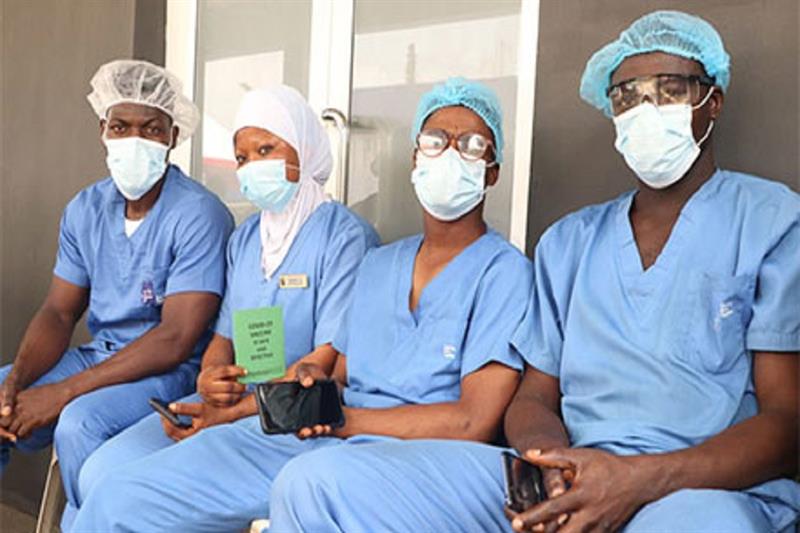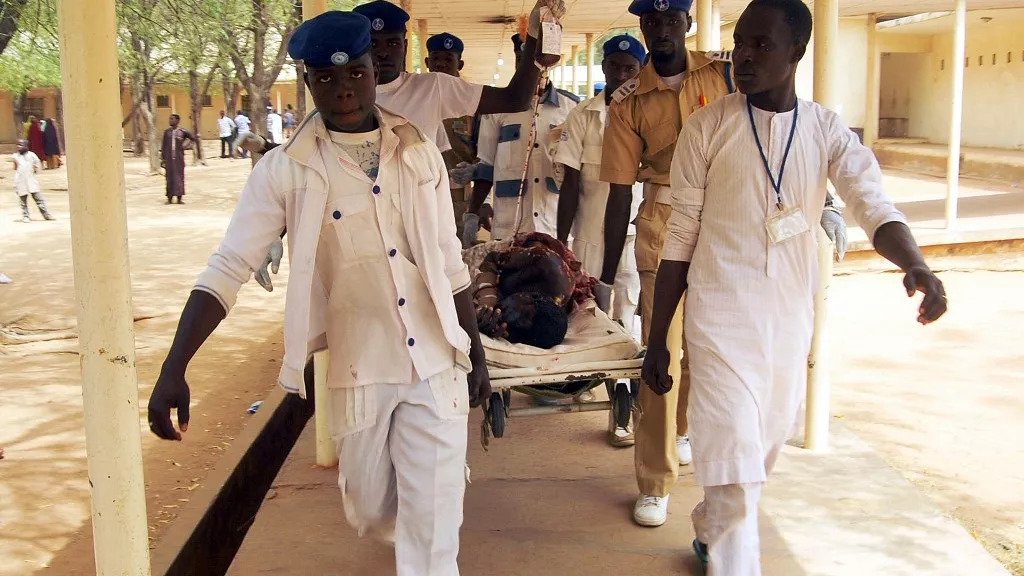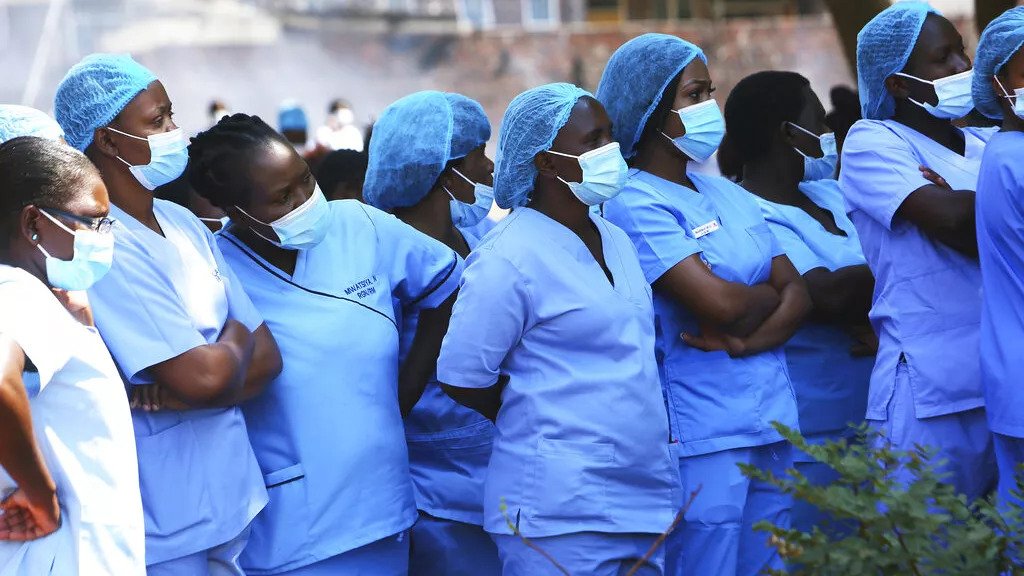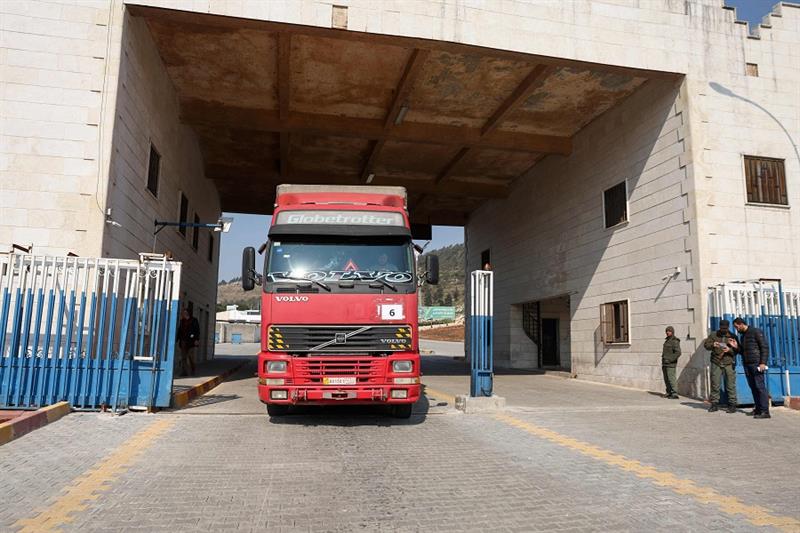AP , Wednesday 17 May 2023
Doctors in Nigerian public hospitals on Wednesday kicked off a five-day strike to demand better conditions, leading to health care being shut for many patients.

The strike by the resident doctors became necessary after the government’s refusal to increase their salaries and pay arrears owed some of their members as well as to invest more in hospitals, according to Dr. Innocent Orji, president of the Nigerian Association of Resident Doctors, or NARD.
Although the current work stoppage doesn’t affect specialist doctors or nurses, medical residents make up the bulk of health care workers in Nigerian government hospitals.
Such strikes are also common with the public health sector lacking sufficient funding for many years despite the country’s huge earnings as Africa’s biggest economy and top oil producer.
Critics, meanwhile, point to the vast disparity between the government hospitals treating most Nigerians and the medical care abroad that is available to the country’s elite, including Nigerian President Muhammadu Buhari, who often travels to the UK for medical care.
Amid Nigeria’s current economic crisis, the doctors in April threatened to go on strike but “we have not seen any positive sign from the government,” Orji told The Associated Press.
“The government has not called us to the negotiation table. Instead, what we have been getting is threats upon threats,” he said, adding that the warning strike could be extended if talks with the government fail to improve.
Kenyan parents await malaria vaccine amid slow rollout
Cleared / AP
By Rédaction Africanews and AP
n Kenya’s western city of Kisumu, Malaria is endemic. Parents queue to have their children jabbed.
They will receive the RTS,S vaccine which acts against Plasmodium falciparum, the deadliest malaria parasite globally and the most prevalent in Africa.
That vaccine, sold by GlaxoSmithKline as Mosquirix, is about 30% effective. Despite medical trials for other parasitic and mosquito-borne diseases, progress is painstaking but hope is on the horizon. R21 vaccine, whose preliminary results from early testing have suggested that it is far more effective than the RTS,S malaria vaccine the only one currently authorised for use by the WHO.
“It’s very important for the research specialists to try to invest resources and time to come up with a one-time vaccine that will help to manage this disease once and for all for mothers so that we reduce the cases of infant fatalities,” Sarafina Okoth, a mother of 6-month-old says.
According to CDC estimates, more than 3.5 million people in Kenya get malaria every year. Over 10,000 die from it. Last month Kenya said it will expand the use of or RTS,S (a the four-dose malaria vaccine), in an additional 25 sub-counties within the eight lake-endemic counties.
Hope in the horizon
Since September 2019, Kenya’s National Vaccines, and Immunization Programme (NVIP) working collaboratively with the Division of National Malaria Program (DNMP) has provided the malaria vaccine as part of routine immunization in 26 sub-counties across eight counties (Homabay, Kisumu, Migori, Siaya, Busia, Bungoma, Vihiga, and Kakamega) in Western Kenya.
Still at the “Pediatric Ward 2”, many patients here are losing patience because of the slow of vaccine rollout.
Lydia Kemunto is caring for her 6-year-old daugther Moraa: “This is not the first time she has been sick with malaria. She has been ailing from malaria and gets treated, but this time, it is much more serious. I would like to make an appeal, if there is a drug that can stop this, let it come. If there is a treatment available to help us because the cost of living has gone up so high.”
“I have already spent a lot (to treat my child). Sometimes I wonder if I should take care of the child’s medical treatments or buy them food to eat.”
According to the WHO, there were 247 million cases of malaria in 2021, and 619,000 people died from it.
The vast majority of malaria cases are in Africa, 96% of all the deaths in this region are among children under the age of five.
Preliminary results from early testing have suggested that the R21vaccine developed by the Jenner Institute at the University of Oxford is far more effective than the RTS,S malaria vaccine.
Late-stage testing of the R21 vaccine is still underway in Burkina Faso, Kenya, Mali and Tanzania, with results expected later this year.
Results from an earlier trial released last year showed that in children vaccinated in Burkina Faso, the R21 vaccine was up to 80% effective depending on how much of an immune-boosting ingredient was included in the shots.
Ghana became the first country to approve its rollout on 13 April.
Parents and school draw awareness to autism in The Congo
SIA KAMBOU/AFP or licensors
By Rédaction Africanews and AFP
Lucia is a 7-year-old bubbly girl. She is playing with her mother in their living room in The Congo’s capital, Brazzaville.
Ngouembe Laskine Chalvee has progressively learnt to help her autistic daughter thrive.
The family discovered Lucia’s condition when she was 4.
“At the beginning it was difficult for me because it was a first to me, I was just discovering that autism existed,” the mother remembers.
“I tried to do some research, I spoke first with her father, it was a little difficult with him- he was optimistic saying all is normal and that she is going to talk.”
It is when teachers raised the issue of Lucia’s cognitive abilities that her parents consulted a neuropsychiatrist.
The mother then designed a special program for Lucia following the doctor’s advice. It focuses on activities the child likes which includes visiting the park.
“I am very patient with her even when I take her to the park – I always prepare what she’ll feed animals with, it can be biscuits and mangoes. She really loves animals. When we arrive there, she feeds the monkeys and we can hear her speak, she says ‘baby monkey you can have this, this is for my little baby monkey, don’t be bad’ and in theses instances she talks.”
Welcoming an autistic child
Parents of autistics children and an inclusive school are committed to raising awareness in the Congo. La Case Dominique welcomes children with autism and Down Syndrome. The school was set up in 1999 by the Religious Sisters of Saint Martin.
“The objective is basically to teach the Congolese,” the coordinator of La Case Dominique school starts. The aims is to “tell them that an autistic child is a child like any other one, a child who must be welcomed, who has rights and whom we must try to understand in order to better accompany him,” Sister Ida Louvouandou concludes.
Autism is a human development disorder characterized by social learning and communication difficulties, with stereotyped behaviours, highly repetitive gestures, and lack of coordination of movement.
To this day autism is considered by many Congolese as a mystical disease with witchcraft origins. Prejudice attitudes push some parents to hide their autistic children.
There are no official statistics on the number of autistic children in the country.
UK halts active recruitment of health workers from Nigeria to combat brain drain crisis

AMINU ABUBAKAR/AFP
By Rédaction Africanews with Agencies
The United Kingdom government has announced its decision to halt the recruitment of health workers from Nigeria, placing the country on the red list of nations not to be targeted for recruitment.
The move comes after the World Health Organisation (WHO) identified Nigeria as one of 55 countries with significant health workforce challenges, in a report released a month ago.
Consequently, the UK government has advised health and social care employers not to actively seek workers from these countries except where there is a government-to-government agreement.
This directive is highlighted in a statement on the UK government’s website titled ‘Code of Practice for the international recruitment of Health and social care personnel in England.’
“Consistent with the WHO Global Code of Practice principles and articles, and as explicitly called for by the WHO Global Code of Practice 10-year review, the listed countries should be prioritised for health personnel development and health system-related support…” part of the statement reads.
“Countries on the list should not be actively targeted for recruitment by health and social care employers, recruitment organisations, agencies, collaborations, or contracting bodies unless there is a government-to-government agreement in place to allow managed recruitment undertaken strictly in compliance with the terms of that agreement.
It would be recalled that in 2021, the UK suspended the recruitment of healthcare workers from Nigeria and 46 other countries.
The country noted that the increasing scale of health and social care worker migration from low and lower-middle-income countries threatens the achievement of their nation’s health and social care goals, ThePunch reports.
Currently, there are 11,055 Nigerian-trained doctors in the UK, according to the UK General Medical Council’s data.
Nigeria has the third-highest number of foreign doctors working in the United Kingdom. The top countries are India and Pakistan.
Zimbabwe to criminalise foreign recruitment of health workers

Tsvangirayi Mukwazhi/Copyright 2020 The AP. All rights reserved.
By Rédaction Africanews with Agencies
Zimbabwe’s Vice-President, Constantino Chiwenga, announced that the country intends to introduce a law that would make it illegal for other nations to recruit its health workers.
The move aims to prevent the loss of valuable healthcare professionals to other countries, which has been a long-standing issue for Zimbabwe’s healthcare system.
Mr Chiwenga, who is also the health minister, stated that the loss of healthcare professionals is comparable to human trafficking.
He announced stricter penalties for those who he alleged had deprived the nation of its human capital.
“If one deliberately recruits and makes the country suffer, that’s a crime against humanity. People are dying in hospitals because there are no nurses and doctors. That must be taken seriously,” Mr Chiwenga said on Wednesday.
“Zimbabwe frowns at this heinous crime which is also a grave violation of human rights,” he added.
Local media say more than 4,000 nurses and doctors have left Zimbabwe since February 2021.
The UK’s National Health Service has been an attractive destination for Zimbabwean doctors and nurses as wages are far higher than those paid back home.
Last month, the UK halted the recruitment of Zimbabwean health workers after the southern African country was placed by the World Health Organisation on the red list, which denotes countries facing serious health personnel challenges.
According to the Zimbabwe Medical Association, the country has about 3,500 doctors for a population of 15 million people.
Zimbabwe is facing an economic crisis characterized by high inflation that has significantly reduced wages.
WHO report sheds light on extent of infertility worldwide
ALEX MCBRIDE/AFP or licensors
By Africanews
The World Health Organization (WHO) has issued a new report on the extent of infertility in the world, published on Tuesday.
Described as a “major health problem”, about 17.5% of the adult population is affected, or one in six people worldwide.
The report does not look at the causes of infertility but provides an overview of its prevalence by analysing all relevant studies from 1990 to 2021.
All countries and regions of the world share similar problems, the organisation points out, but it believes that the subject is still in need of attention.
“Infertility has not received much attention globally, largely because there has been in the population discussions, there has been much more of a focus on contraception rather than infertility. It has therefore not been seen as a priority”, said Pascale Allotey, Director of Sexual and Reproductive Health and Research, World Health Organization.
Solutions, such as assisted reproduction, remain under-funded and inaccessible to many due to high costs and social stigma, the report also says.
The report also highlights a lack of data in many countries, particularly in Africa, the Eastern Mediterranean and South East Asia.
Equatorial Guinea confirms outbreak of Marburg virus, nine persons dead
AFP
Nine people have died of Marburg virus disease, a hemorrhagic fever nearly as deadly as Ebola, in eastern Equatorial Guinea, a small central African country that has quarantined a province to contain the “epidemic,” the health minister announced Monday.
Last week, the government announced it was investigating suspected cases of hemorrhagic fever. Only three people with “mild symptoms” of the disease are currently isolated in a hospital in this sparsely populated rural area bordering Gabon and Cameroon, Mitoha Ondo’o Ayekaba said at a press conference.
The three people hospitalized “have mild symptoms (…) which are evolving favorably,” he added.
Equatorial Guinea “declares today the health alert for a Marburg hemorrhagic fever in the province of Kie-Ntem and in the (neighboring) district of Mongomo,” said the minister.
A “containment plan has been put in place” in close collaboration with the UN World Health Organization (WHO) “to deal with the epidemic” in this area covered by dense equatorial forest in the eastern part of the country’s mainland, which also includes two main islands.
The Marburg virus is transmitted to humans by fruit bats and is spread in humans through direct contact with the body fluids of infected persons, or with surfaces and materials.
UN warns of aid failure for Syria as quake toll nears 30,000
AFP , Sunday 12 Feb 2023
The UN denounced Sunday a failure to get desperately needed aid to war-torn regions of Syria, while warning that the death toll of nearly 30,000 from an earthquake that also devastated Turkey could at least double.

A UN convoy with supplies for northwest Syria arrived via Turkey, but the agency’s relief chief Martin Griffiths said much more was needed for millions whose homes were destroyed.
“We have so far failed the people in northwest Syria. They rightly feel abandoned. Looking for international help that hasn’t arrived,” Griffiths said on Twitter.
“My duty and our obligation is to correct this failure as fast as we can.”
Aid has been slow to arrive in Syria, where years of conflict have ravaged the healthcare system, and parts of the country remain under the control of rebels battling the government of President Bashar al-Assad, which is under Western sanctions.
The UN convoy of ten trucks crossed into northwest Syria via the Bab al-Hawa border crossing, according to an AFP correspondent, carrying shelter kits including plastic sheeting, ropes and screws and nails, as well as blankets, mattresses and carpets.
Tens of thousands of rescue workers continued to scour flattened neighbourhoods in freezing weather that has deepened the misery of millions now in desperate need of aid.
But security concerns prompted the suspension of some operations, and dozens of people have been arrested for looting or trying to defraud victims in the aftermath of the quake in Turkey, according to state media.
26 million people affected
Miraculous tales of survival still emerged, though experts caution that hopes for finding people alive in the devastation dim with each passing day.
A seven-month-old baby named Hamza was rescued in southern Hatay province more than 140 hours after the quake, while Esma Sultan, 13, was also saved in Gaziantep, state media reported.
At the Vatican, Pope Francis called for “concrete support” for the quake victims, urging people to “think what we can do to help them.”
The United Nations has warned that at least 870,000 people urgently need hot meals across Turkey and Syria. In Syria alone, up to 5.3 million people may have been made homeless.
Almost 26 million people have been affected by the earthquake, the World Health Organization (WHO) said as it appealed Saturday for $42.8 million to cope with immediate health needs after dozens of hospitals were damaged.
Turkey’s disaster agency said more than 32,000 people from Turkish organisations are working on search-and-rescue efforts, along with 8,294 international rescuers.
But, in many areas, rescue teams said they lacked sensors and other advanced search equipment, meaning they were often reduced to carefully digging through destroyed buildings with shovels or only their hands.
“If we had this kind of equipment, we would have saved hundreds of lives, if not more,” said Alaa Moubarak, head of civil defence in Jableh, northwest Syria.
Anger grows
Damascus said it had approved the delivery of humanitarian assistance to quake-hit areas outside its control in Idlib province and a convoy was expected to leave on Sunday, though the delivery was later postponed without explanation.
The transport ministry said 62 aid planes had landed in Syria this week with more on the way in coming days, in particular from Saudi Arabia.
UN Secretary-General Antonio Guterres has urged the Security Council to authorise the opening of new cross-border aid points between Turkey and Syria, with a meeting to discuss Syria possible in the coming days.
Greece’s Foreign Minister Nikos Dendias pledged further support as he met with his Turkish counterpart in quake-hit Antakya, putting aside the longstanding rivalry between the two NATO members.
“We do not need to wait for natural disasters to improve our relations,” Dendias said.
But after days of grief and anguish, anger in Turkey has been growing over the poor quality of buildings as well as the government’s response to the country’s worst disaster in nearly a century.
Officials say 12,141 buildings were either destroyed or seriously damaged in the earthquake.
Turkish police reportedly detained 12 people on Saturday, including contractors, over collapsed buildings in the southeastern provinces of Gaziantep and Sanliurfa.
Officials and medics said 24,617 people had died in Turkey and 3,574 in Syria. The confirmed total now stands at 28,191.
Humanitarian partners seek $2.6 billion to assist 7.6 million people in Somalia in 2023
By CGTN Africa
The United Nations and humanitarian partners in Somalia together with federal and state governments on Wednesday released the 2023 Humanitarian Response Plan (HRP) for Somalia, which seeks 2.6 billion U.S. dollars to assist about 7.6 million people.
An estimated 8.25 million people, nearly half of the population, need immediate lifesaving humanitarian and protection assistance.
Amid an anticipated reduction in funding for humanitarian assistance, 8.3 million people will likely experience high levels of acute food insecurity between April and June, including more than 727,000 who are likely to face catastrophic conditions. About 8 million people lack access to safe water, sanitation and hygiene services, a statement from the Office for Coordination of Humanitarian Affairs (OCHA) said.
“The efforts of local communities and the scale-up of humanitarian assistance prevented famine thresholds from being surpassed in 2022, but millions of lives remain on the line,” Adam Abdelmoula, Humanitarian Coordinator for Somalia, said.
According to OCHA, humanitarian organizations, local communities and government authorities have ramped up responses and reached 7.3 million people in 2022.
2023 World cancer day: Nigerians celebrate with 5km walk
africanews
As the rest of the world marks 2023 world cancer day celebration, in Abuja, Nigeria a group held an annual 5km walk awareness campaign.
Since 2015, Pink Blue has been hosting this project an initiative led by the Union for International Cancer Control.
With this year’s theme “closing the care gap”, the group, appeals for more medical personnel in the health sector, adding that Nigeria bears a whole burden of cancer.
“So we are committed to this year’s theme “ closing the care gap” and we are asking all stakeholders in the health sector, the Ministry of health, the medical association, all those concerned to do a lot more for the cancer patients, said Gloria Nwajiogo, President, network of cancer victims, Nigeria”.
“Cancer is real and it affects humans in Africa and in Nigeria, every year alone we have 1.1million alone in Africa, we have over 7000 deaths in Africa, so we felt it right to partner with Project Pink Blue to support and create awareness, Dupe Olushola, MDC Transcorp Hotel PLC, Abuja”.
Some cancer survivors at the event encouraged other patients to be hopeful and abide by medical prescriptions adding that the disease can be managed successfully.
“I have survived cancer for the past five years and I am here to show the world that we can conquer cancer no matter what it takes. This will give hope to people, Violet Tutasi, survivor”
“It will encourage others and make them bold, when you tell somebody, I have cancer, they will look at you as if you are a dead person, when I was diagnosed, I was so afraid, I couldn’t mingle with people, I was isolated but when I saw people that have survived working with this cancer group, I was relieved a bit, Onyekachi Chidinma, Survivor”.
Nigeria is one of the countries in the world with the highest cancer mortality rate with approximately 4 out of 5 cases resulting in death, the group says awareness like this is a wake-up call for victims to take precautions on the diseases.
World Cancer Day was made official at the first World Summit Against Cancer in 2000. The event took place in Paris and was attended by members of cancer organizations and prominent government leaders from around the world.

